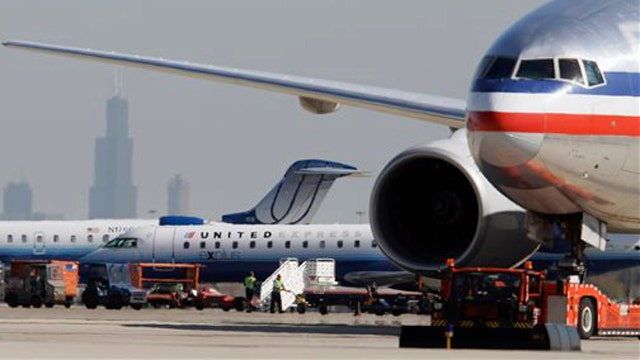EPA preparing to regulate emissions for airline industry
Supporters say rules will help environment, save airlines money
The Environmental Protection Agency will soon announce it plans to regulate airline emissions, asserting they contribute to global warming and endanger public health, according to industry and environmental groups.
Those findings will prompt a regulatory process for the EPA to determine and enforce aircraft emissions limits, following a similar effort to limit emissions by cars, trucks and power plants.
But conservatives say higher airplane efficiency standards will only force airlines to raise ticket prices or install more seats on already cramped flights.
"Airlines already have a tremendous incentive to reduce fuel burn, and reduce CO2 emissions right now," said Sam Batkins, the director of regulatory policy at the American Action Forum. "Airplanes themselves are already efficient and are already getting more efficient each year."
Airlines are among the most efficiency-minded transportation industries. Normally tight-margin companies, the less fuel airlines burn, the more money they make.
"There's not a market failure in airline efficiency," said Batkins.
However, environmental groups contend airlines are failing to realize their full fuel-efficiency potential.
"They can be doing things a lot more efficiently than they are now. And they've reached the peak of their incentive -- now they need a little push from the federal government to extract increased reductions," said S. William Becker, executive director of the National Association of Clean Air Agencies. "If the president is serious about hitting his climate target, which is reducing greenhouse gases by 28 percent in 2025, below 2005 levels, he can't ignore imposing additional greenhouse gas reductions on this uncontrolled industry."
Becker said the industry could use lower-carbon fuels, idle engines less and further upgrade its systems.
The airline industry said it has made significant progress reducing emissions.
"The U.S. airlines have a strong record of fuel efficiency and carbon emissions reduction, having improved their fuel efficiency by 120 percent between 1978 and 2014, saving 3.8 billion metric tons CO2 -- roughly the equivalent of taking 23 million cars off the road in each of those years," Vaughn Jennings, the managing director of government and regulatory communications at Airlines for America, said in a statement.
The EPA says American airplanes are responsible for about 3 percent of all U.S. greenhouse gas emissions and about a third of all greenhouse gas emissions among aircraft worldwide.
"As aviation is a global industry, with airlines and aircraft operators operating internationally and aircraft manufacturers selling their aircraft in international markets, it is critical that aircraft emissions standards continue to be agreed to at the international level," said Jennings.
Environmental groups said those standards are too low.
"We urge EPA to use this rulemaking to achieve a real reduction in emissions from aviation, rather than simply following ICAO's (International Civil Aviation Organization) weak lead with a standard that will be dwarfed by industry growth," said Sarah Burt of environmental group Earthjustice.
The administration is expected to discuss airplane emission standards at the G-7 summit in Germany next week.





